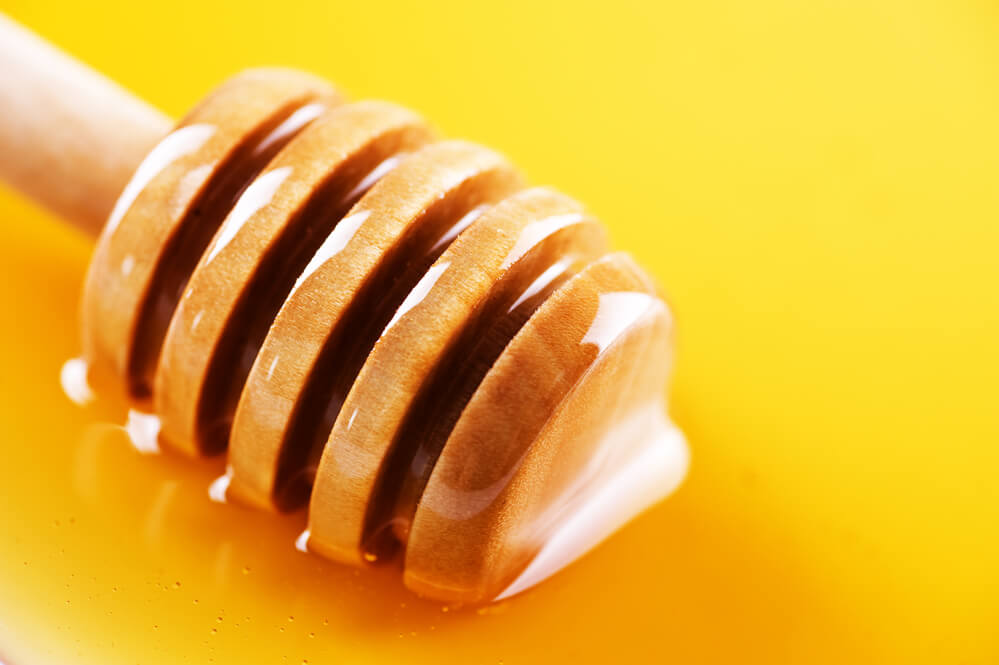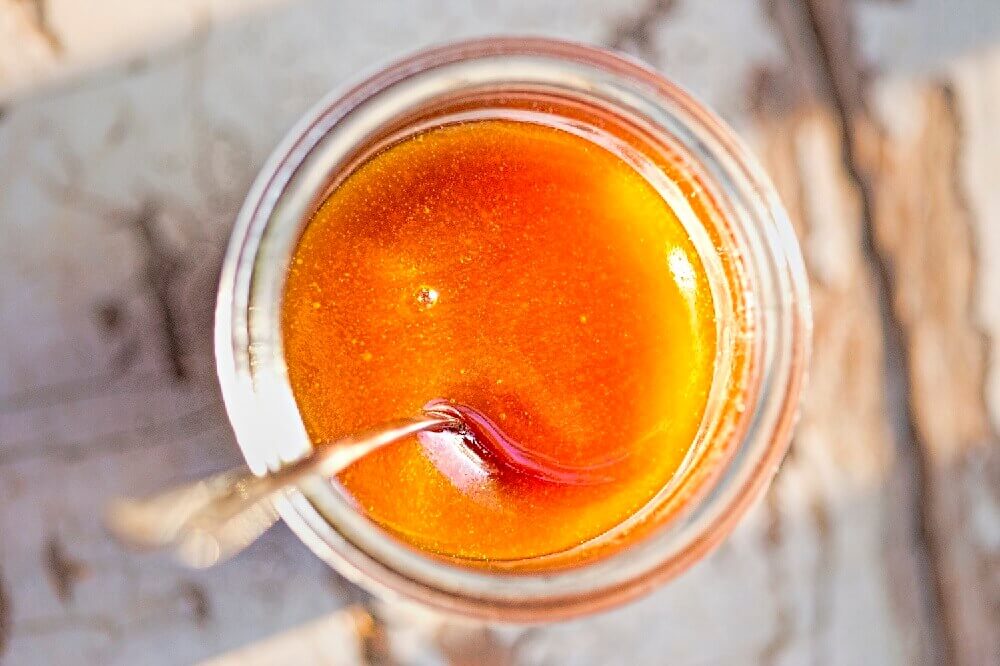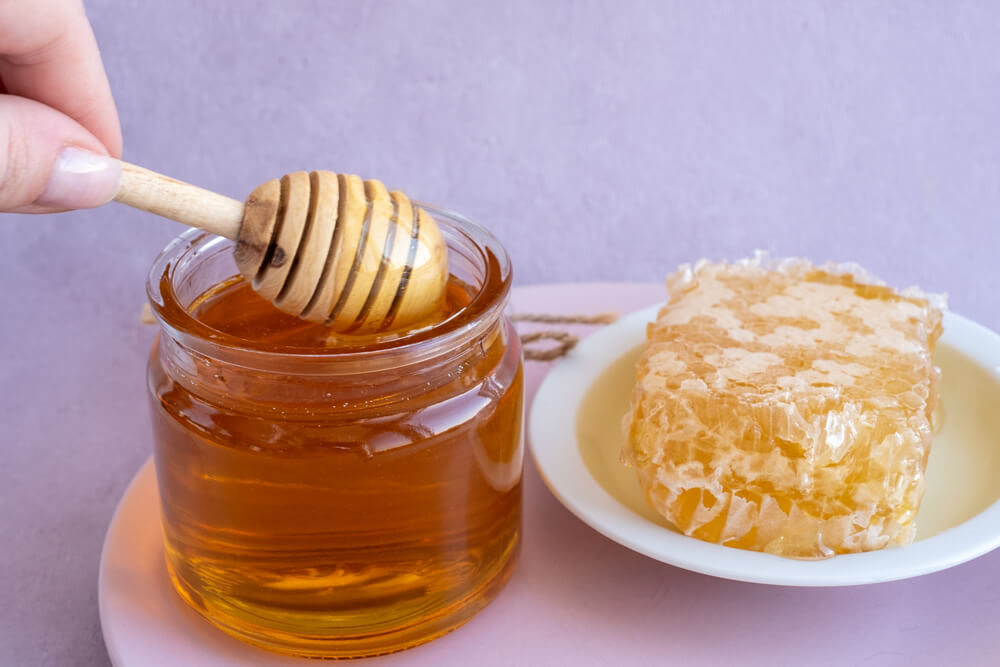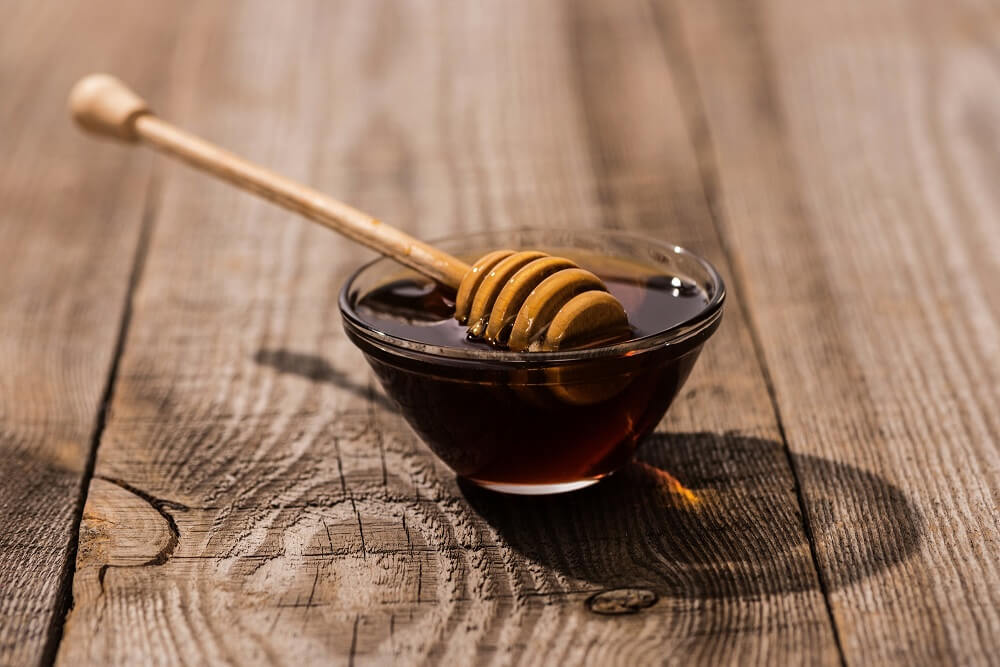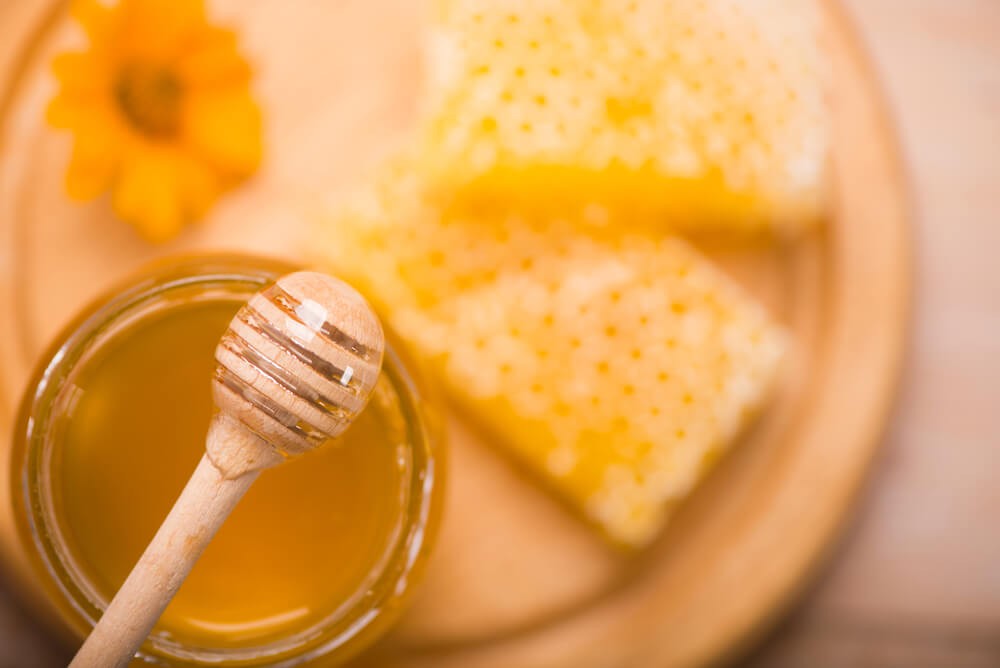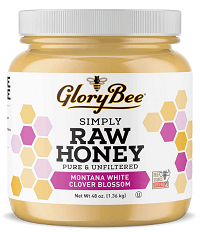Table of Contents:
What is Honey Pasteurization?
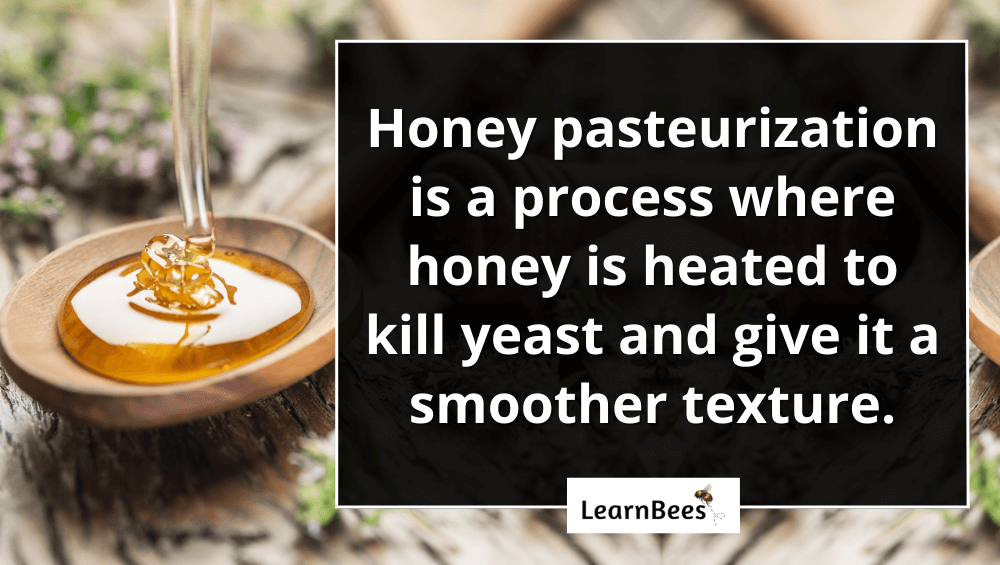
Honey pasteurization is a process where honey is heated. This destroys yeast and gives the honey a smoother texture. It can also help manufacturers reduce production costs.(1)
Simply put:
Pasteurized honey is cheaper to produce than raw honey.
This is because pasteurized honey is often heated, filtered, and diluted with cheaper ingredients. For example, it’s not uncommon for manufacturers to add sweeteners like high fructose corn syrup to pasteurized honey.
Diluting the honey with cheaper ingredients allows manufacturers to produce larger quantities at lower costs.
With that in mind, the FDA warns that overly processed honey is no longer considered real honey.(2)
How come?
Because pasteurized honey that’s been diluted with other ingredients is more like sugar syrup than genuine honey.
Additionally, honey loses its enzymes and antioxidants during the heating process. This causes the honey to get stripped of its antibacterial, anti-inflammatory, and anti-fungal benefits.(3, 4)
But keep in mind:
Raw honey is different than pasteurized honey.
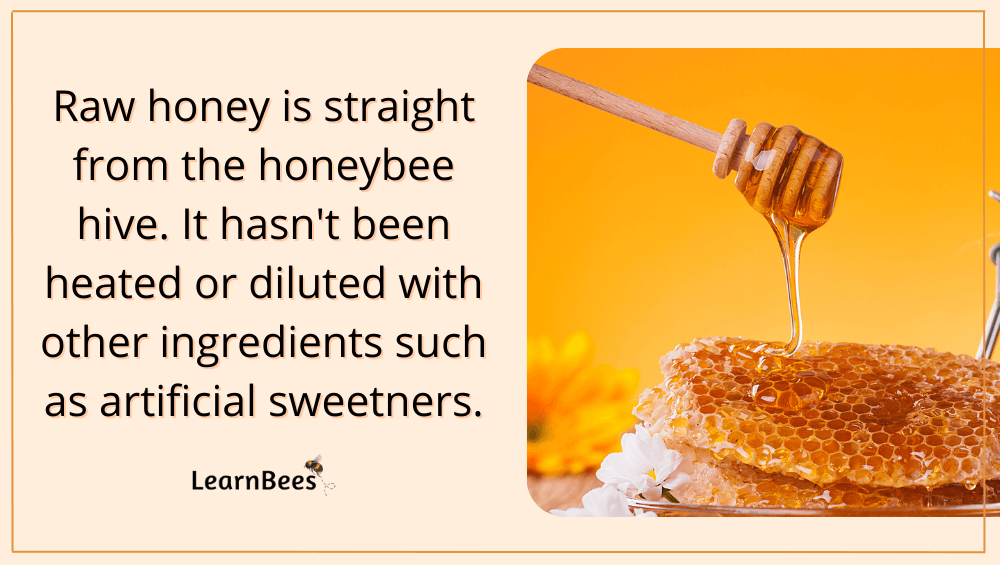
Raw honey is honey straight from the honeybee hive. As such, raw honey maintains its health benefits.
For example, raw honey contains nearly 30 types of bioactive plant compounds. These are known as polyphenols, and they act as antioxidants.(5, 6)
Such antioxidants have been linked with numerous health benefits, including lowering the risk of heart disease, certain cancers, and reducing inflammation.(7, 8)
One study found that raw honey contained up to 4.3 times more antioxidants than processed honey.(9)
Raw honey has also been successful in clinical trials in treating skin conditions such as eczema, psoriasis, and diabetes-related foot ulcers.
Many people also enjoy raw honey for its unique taste. It has a more complex and bold flavor that you can’t find in pasteurized honey. The texture is creamy and thick, allowing it to spread easily on warm bread or biscuits.
Does Pasteurization Ruin Honey?
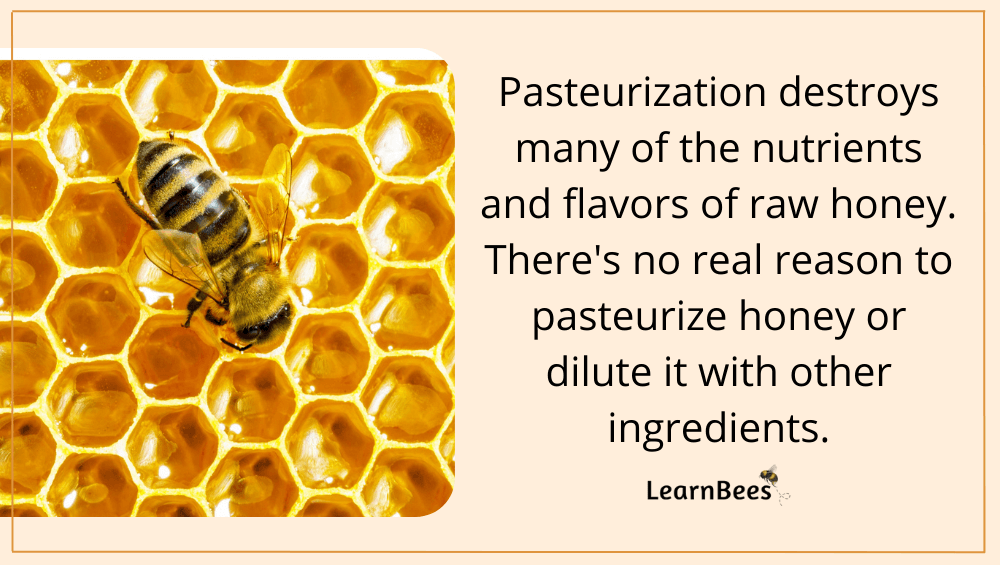
Pasteurization kills most of the nutrients and flavor of raw honey. It’s a process primarily used by commercial honey manufacturers to cut costs.
Unless the label reads “raw honey,” most grocery store honey has already been pasteurized.
In contrast:
Local beekeepers tend to keep their honey raw and unfiltered. There’s no real reason to pasteurize honey or dilute it with other ingredients.
As mentioned, raw honey is antibacterial and anti-inflammatory. The antimicrobial properties found in raw honey have been studied in medical settings to promote wound healing and stop the spread of harmful bacteria.(10)
Raw honey is also successfully used to treat symptoms associated with upper respiratory infections, such as sore throats and coughs. Further research indicates that raw honey can help people sleep better while suffering from coughs.(11, 12)
How Can You Tell if Honey is Pasteurized?
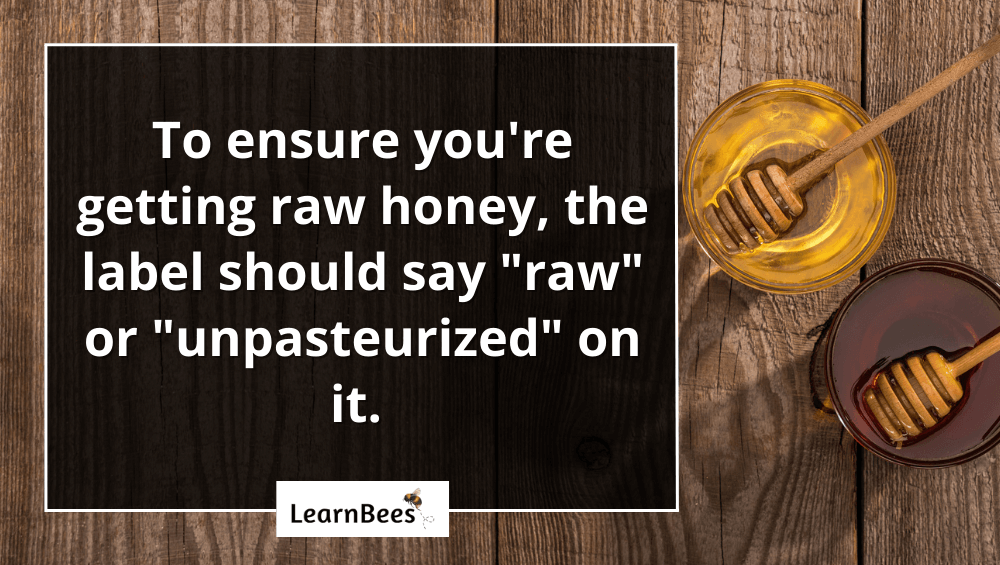
It can be hard to tell if honey is pasteurized just by looking at it.
That said, the best way to ensure you’re getting raw honey is to check the label. The honey label should state that the honey is “raw” or “unpasteurized.”
Keep in mind:
There are over 300 varieties of raw honey. Examples include raw clover honey, blueberry honey, and wildflower honey. Each variety will have a unique taste depending on where it came from.
For example, raw blueberry honey has a sweet taste with fruity undertones. The blueberry flavor isn’t overpowering. Instead, it’s a mild hint of blueberry that settles on the back of your tongue.
Raw wildflower honey is sweet with floral undertones. It tastes delicious by itself or used in tea, coffee, or baking recipes.
Also, some raw honey varieties are sweeter than others.
For instance, tupelo honey is known for its sweetness, while buckwheat honey is milder with a molasses-like flavor.
The bottom line is this:
Ensure the honey you buy says “raw” on the label. That’s how you know you’re getting pure honey that hasn’t been altered.
FAQs on Honey Pasteurization
- Does boiling honey pasteurize it?
- Is pure honey pasteurized?
- Can you pasteurize raw honey at home?
- How can you tell if honey is pasteurized?
- What is the difference between pasteurized and unpasteurized honey?
- Does pasteurized honey contain botulism?
- Why do people pasteurize honey?
- Is unpasteurized honey the same as raw honey?
- Is organic honey pasteurized?
- Is filtered honey pasteurized?
- How do you pasteurize honey?
- Is unpasteurized honey safe to eat?
- Does pasteurized honey crystallize?
- Should honey be pasteurized?
- How long does unpasteurized honey last?
- Can you buy unpasteurized honey?
- Should you refrigerate unpasteurized honey?
- Where do I buy pasteurized honey?
Does boiling honey pasteurize it?
The honey pasteurization temperature doesn’t need to be that high. Most honey is typically pasteurized between 149-158°F (65-70°C) for 30 minutes.
So, boiling honey will pasteurize it. But, it’s not necessary to heat the honey to that high of temperatures.
—> Go back to the FAQs on honey pasteurization
More to Explore:
Is pure honey pasteurized?
No, pure honey typically refers to raw honey. Raw honey is not pasteurized or diluted with other ingredients. Instead, raw honey is left in its natural state, just as the honeybees made it.
Why does this matter?
Because pure honey has numerous health benefits that are lost during the pasteurization process. For example, raw honey is a natural cough suppressant and can help people sleep better if they’re dealing with upper respiratory infections.
—> Go back to the FAQs on honey pasteurization
More to Explore:
Can you pasteurize raw honey at home?
Yes, you can pasteurize honey by heating it to a temperature between 149-158°F (65-70°C) for 30 minutes.
With that in mind, there is no need to pasteurize raw honey at home. First, it’s not necessary to heat the honey to such high temperatures. Second, pasteurizing raw honey kills many of the beneficial enzymes and compounds that make raw honey healthy.
—> Go back to the FAQs on honey pasteurization
More to Explore:
- The Brutally Honest Truth About Sour Honey
- Buckwheat Honey: Uses, Benefits, & Risks
- Can You Eat Honeycombs?
How can you tell if honey is pasteurized?
It can be hard to tell whether honey is pasteurized or not. Both pasteurized and unpasteurized honey can have similar colors and textures.
The best way to know you’re getting raw honey is to ensure the honey bottle says “raw” and “unfiltered” on it.
You can also buy raw honey directly from your local beekeepers. Most beekeepers keep their honey in its natural state. They don’t heat, filter, or dilute their honey with flavors or sugars.
—> Go back to the FAQs on honey pasteurization
More to Explore:
What is the difference between pasteurized and unpasteurized honey?
Pasteurized honey is honey that has been heated to high temperatures (149-158°F or 65-70°C). This process kills the beneficial enzymes and compounds in honey.
Unpasteurized honey is honey that has not been heated, allowing it to retain all of the beneficial enzymes and antioxidants.
Pasteurized honey is commonly found at grocery stores in plastic teddy bear containers.
—> Go back to the FAQs on honey pasteurization
More to Explore:
- The Top 3 Best Manuka Honey Brands
- Orange Blossom Honey: Uses, Benefits, & Risks
- Sourwood Honey: Uses, Benefits, & Risks
Does pasteurized honey contain botulism?
“Does all raw honey contain botulism?” is a frequent question we get asked.
Both pasteurized and unpasteurized (raw) honey can contain spores of the bacteria Clostridium botulinum. This bacteria can lead to botulism, which is particularly troublesome for infants under 12 months old.
As such, babies under 12 months old should not consume honey or honeycomb. Their immune system isn’t fully developed, so they might struggle to fight off the bacteria.
Fortunately, botulism is very rare. An average of 110 cases of botulism are reported yearly in the United States. About 25% of these cases come from food like honey.
That said, honey is a low-risk food that most healthy adults can enjoy without adverse side effects.
—> Go back to the FAQs on honey pasteurization
More to Explore:
Why do people pasteurize honey?
Most individuals and beekeepers don’t pasteurize honey because there’s no need to. It strips away the health benefits while also altering the delicious flavor.
It’s mostly commercial manufacturers that pasteurize honey. They do this to reduce production costs and give the honey a smoother consistency.
Pasteurized honey also won’t crystallize over time because it’s not real honey. This makes it easier to bottle and store for long periods.
Crystallized honey is a natural process that only raw honey goes through. It’s still perfectly safe to eat, although some people don’t like the texture.
To fix crystallized honey, simply place the honey jar in a pot of hot water until it begins melting the crystals. Stir the honey to help break up the crystals, and repeat the process until the honey is liquified again.
—> Go back to the FAQs on honey pasteurization
More to Explore:
Is unpasteurized honey the same as raw honey?
Yes, unpasteurized honey and raw honey are the same things. They both have not been heated or filtered, retaining all their nutrients and enzymes. Pasteurized honey has been heated, so it doesn’t have the same nutritional value as raw honey.
Raw honey comes directly from the beehive. It isn’t altered or diluted with any other substances. You can find raw honey at your local farmer’s market or a beekeeper.
Pasteurized honey, on the other hand, is found in most grocery stores. It has a smoother consistency, but it doesn’t have the same nutritional benefits as raw honey. Not to mention, the taste of pasteurized honey isn’t as good.
—> Go back to the FAQs on honey pasteurization
More to Explore:
Is organic honey pasteurized?
Yes, just because honey is labeled organic doesn’t mean it isn’t pasteurized.
The best way to get unpasteurized honey is to search for honey labels that say “raw” and “unfiltered.”
You can also buy raw honey directly from your local beekeepers. Most beekeepers keep their honey in its natural state. They don’t use flavors or sugars to alter or sweeten their honey.
—> Go back to the FAQs on honey pasteurization
More to Explore:
Is filtered honey pasteurized?
It depends.
Most pasteurized honey is filtered to give it a smoother consistency.
However, honey can be lightly filtered but still be considered raw, unpasteurized honey. The light filtration will remove any traces of pollen or beeswax.
If you’re looking for raw honey, the best thing to do is check the label. If it doesn’t say “raw,” then it’s probably been pasteurized.
—> Go back to the FAQs on honey pasteurization
More to Explore:
How do you pasteurize honey?
Pasteurizing honey involves heating it to a specific temperature for a period of time. The most common way to pasteurize honey is to heat it at 145°F for at least 30 minutes.
—> Go back to the FAQs on honey pasteurization
More to Explore:
- Honey for Skin Benefits: Directions, Uses, & Risks
- 8 Scientific Benefits of Raw Honey
- Allergic to Honey: Signs of a Honey Allergy + Treatment
Is unpasteurized honey safe to eat?
People often ask, “Can unpasteurized honey make you sick?”
The good news is that unpasteurized honey is safe to eat for most people. In fact, it’s actually healthier than pasteurized honey because it still contains all of the nutrients and enzymes that are stripped away during the pasteurization process.
The only people who should avoid unpasteurized honey are infants under 12 months old and people with weakened immune systems.
For infants, unpasteurized honey can contain botulism spores. These spores are mostly harmless to adults because our immune system is stronger. However, infants’ immune systems are not fully developed, so they can’t handle the spores. This can lead to a serious illness called botulism.
—> Go back to the FAQs on honey pasteurization
More to Explore:
Does pasteurized honey crystallize?
No, pasteurized honey doesn’t crystallize like raw honey does.
However, keep in mind that crystallization is a good sign. It means that your honey is raw and unprocessed. Pasteurized honey may be more readily available at grocery stores, but it doesn’t have the same nutritional value as raw honey.
—> Go back to the FAQs on honey pasteurization
More to Explore:
Should honey be pasteurized?
We don’t recommend pasteurizing honey.
Why?
Because the pasteurization of honey destroys the nutrients and enzymes that make raw honey a superfood.
—> Go back to the FAQs on honey pasteurization
More to Explore:
- Honey For Allergies: Is it a Potential Cure?
- How to Substitute Honey for Sugar
- What’s the Melting Point of Beeswax?
How long does unpasteurized honey last?
Unpasteurized, raw honey never expires if stored in an airtight container. It may change color or texture over time, but it will still be safe to eat. Raw, unpasteurized honey begins solidifying in a process called crystallization.
People also ask:
Will pasteurized honey ferment?
No, pasteurized honey won’t ferment because the heating process kills off the microbes needed for fermentation.
—> Go back to the FAQs on honey pasteurization
More to Explore:
- Fermented Garlic and Honey Recipe
- What’s the Difference Between Raw and Organic Honey?
- Cinnamon Honey: Are There Health Benefits?
Can you buy unpasteurized honey?
Yes, you can find unpasteurized honey from a local beekeeper or from some online retailers.
Ensure the label says “unpasteurized” or “raw” to ensure you’re getting genuine honey.
—> Go back to the FAQs on honey pasteurization
More to Explore:
- Beeswax on Hair: Benefits, Risks, & How to Use It
- Beeswax vs. Soy Wax: Which is Better for Candle Making?
- How to Make Fermented Honey
Should you refrigerate unpasteurized honey?
No, raw honey should be stored at room temperature to prevent crystallization. Crystallization occurs naturally as raw honey solidifies over time. Crystallization also speeds up in colder temperatures, such as in the refrigerator.
—> Go back to the FAQs on honey pasteurization
More to Explore:
- Honey for the Face: Can You Apply it to the Skin?
- Does Honey Need to Be Refrigerated?
- How Many Carbs Are in Honey?
Where do I buy pasteurized honey?
Pasteurized honey is more readily available than raw honey. You can find it at most grocery stores and many online retailers. If the honey doesn’t say “raw” on the label, then you can assume the honey is pasteurized.
It’s hard to tell the difference between processed and unprocessed honey. So check the honey label to ensure you’re getting the product you want.
